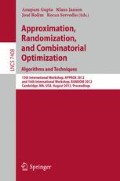Abstract
Kuznetsov and Tsybakov [11] considered the problem of storing information in a memory where some cells are ‘stuck’ at certain values. More precisely, For 0 < r,p < 1 we want to store a string z ∈ {0,1}rn in an n-bit memory x = (x 1,…,x n ) in which a subset S ⊆ [n] of size pn are stuck at certain values u 1,…,u pn and cannot be modified. The encoding procedure receives S, u 1,…,u pn and z and can modify the cells outside of S. The decoding procedure should be able to recover z given x (without having to know S or u 1,…,u pn ). This problem is related to, and harder than, the Write-Once-Memory (WOM) problem.
We give explicit schemes with rate r ≥ 1 − p − o(1) (trivially, r ≤ 1 − p is a lower bound). This is the first explicit scheme with asymptotically optimal rate. We are able to guarantee the same rate even if following the encoding, the memory x is corrupted in \(o(\sqrt{n})\) adversarially chosen positions. This more general setup was first considered by Tsybakov [24] (see also [10,8]). and our scheme improves upon previous results.
We utilize a recent connection observed by Shpilka [21] between the WOM problem and linear seeded extractors for bit-fixing sources. We generalize this observation and show that memory schemes for stuck-at memory are equivalent to zero-error seedless dispersers for bit-fixing sources. We furthermore show that using zero-error seedless dispersers for affine sources (together with linear error correcting codes with large dual distance) allows the scheme to also handle adversarial errors.
It turns out that explicitness of the disperser is not sufficient for the explicitness of the memory scheme. We also need that the disperser is efficiently invertible, meaning that given an output z and the linear equations specifying a bit-fixing/affine source, one can efficiently produce a string x in the support of the source on which the disperser outputs z.
In order to construct our memory schemes, we give new constructions of zero-error seedless dispersers for bit-fixing sources and affine sources. These constructions improve upon previous work by [14,6,2,25,13] in that for sources with min-entropy k, they (i) achieve larger output length m = (1 − o(1)) ·k whereas previous constructions did not, and (ii) are efficiently invertible, whereas previous constructions do not seem to be easily invertible.
Access this chapter
Tax calculation will be finalised at checkout
Purchases are for personal use only
Preview
Unable to display preview. Download preview PDF.
References
Ben-Sasson, E., Kopparty, S.: Affine dispersers from subspace polynomials. In: STOC, pp. 65–74 (2009)
Bourgain, J.: On the construction of affine extractors. Geometric and Functional Analysis 17(1), 33–57 (2007)
Chor, B., Goldreich, O., Håstad, J., Friedman, J., Rudich, S., Smolensky, R.: The bit extraction problem of t-resilient functions. In: 26th Annual Symposium on Foundations of Computer Science, pp. 396–407 (1985)
Cohen, A., Wigderson, A.: Dispersers, deterministic amplification, and weak random sources. In: 30th Annual Symposium on Foundations of Computer Science, pp. 14–19 (1989)
Gabizon, A., Raz, R., Shaltiel, R.: Deterministic extractors for bit-fixing sources by obtaining an independent seed. SICOMP: SIAM Journal on Computing 36(4), 1072–1094 (2006)
Gabizon, A., Shaltiel, R.: Increasing the output length of zero-error dispersers. Random Struct. Algorithms 40(1), 74–104 (2012)
Goldreich, O.: A Sample of Samplers: A Computational Perspective on Sampling. In: Goldreich, O. (ed.) Studies in Complexity and Cryptography. LNCS, vol. 6650, pp. 302–332. Springer, Heidelberg (2011)
Heegard, C.: Partitioned linear block codes for computer memory with ’stuck-at’ defects. IEEE Transactions on Information Theory 29(6), 831–842 (1983)
Kamp, J., Zuckerman, D.: Deterministic extractors for bit-fixing sources and exposure-resilient cryptography. SIAM J. Comput., 1231–1247 (2007)
Kuznetsov, A.V., Kasami, T., Yamamura, S.: An error correcting scheme for defective memory. IEEE Trans. Inform. Theory 24(6), 712–718 (1978)
Kuznetsov, A.V., Tsybakov, B.S.: Coding in a memory with defective cells. Probl. Peredachi Inf. 10, 52–60 (1974)
Lastras-Montaño, L.A., Jagmohan, A., Franceschini, M.: Algorithms for memories with stuck cells. In: ISIT, pp. 968–972 (2010)
Li, X.: A new approach to affine extractors and dispersers. In: IEEE Conference on Computational Complexity, pp. 137–147 (2011)
Rao, A.: Extractors for low-weight affine sources. In: IEEE Conference on Computational Complexity, pp. 95–101 (2009)
Raz, R., Reingold, O., Vadhan, S.P.: Extracting all the randomness and reducing the error in trevisan’s extractors. J. Comput. Syst. Sci. 65(1), 97–128 (2002)
Rivest, R.L., Shamir, A.: How to reuse a “write-once” memory. Information and Control, 1–19 (1982)
Shaltiel, R.: How to get more mileage from randomness extractors. Random Struct. Algorithms, 157–186 (2008)
Shaltiel, R.: Dispersers for affine sources with sub-polynomial entropy. In: FOCS, pp. 247–256 (2011)
Shaltiel, R.: An Introduction to Randomness Extractors. In: Aceto, L., Henzinger, M., Sgall, J. (eds.) ICALP 2011, Part II. LNCS, vol. 6756, pp. 21–41. Springer, Heidelberg (2011)
Shaltiel, R., Umans, C.: Simple extractors for all min-entropies and a new pseudorandom generator. J. ACM 52(2), 172–216 (2005)
Shpilka, A.: Capacity Achieving Two-Write WOM Codes. In: Fernández-Baca, D. (ed.) LATIN 2012. LNCS, vol. 7256, pp. 631–642. Springer, Heidelberg (2012)
Trevisan, L.: Extractors and pseudorandom generators. J. ACM 48(4), 860–879 (2001)
Tsybakov, B.S.: Additive group codes for defect correction. Prob. Peredachi Inf. 11(1), 111–113 (1975)
Tsybakov, B.S.: Defect and error correction. Prob. Peredachi Inf. 11(3), 21–30 (1975)
Yehudayoff, A.: Affine extractors over prime fields. Combinatorica 31(2), 245–256 (2011)
Author information
Authors and Affiliations
Editor information
Editors and Affiliations
Rights and permissions
Copyright information
© 2012 Springer-Verlag Berlin Heidelberg
About this paper
Cite this paper
Gabizon, A., Shaltiel, R. (2012). Invertible Zero-Error Dispersers and Defective Memory with Stuck-At Errors. In: Gupta, A., Jansen, K., Rolim, J., Servedio, R. (eds) Approximation, Randomization, and Combinatorial Optimization. Algorithms and Techniques. APPROX RANDOM 2012 2012. Lecture Notes in Computer Science, vol 7408. Springer, Berlin, Heidelberg. https://doi.org/10.1007/978-3-642-32512-0_47
Download citation
DOI: https://doi.org/10.1007/978-3-642-32512-0_47
Publisher Name: Springer, Berlin, Heidelberg
Print ISBN: 978-3-642-32511-3
Online ISBN: 978-3-642-32512-0
eBook Packages: Computer ScienceComputer Science (R0)

